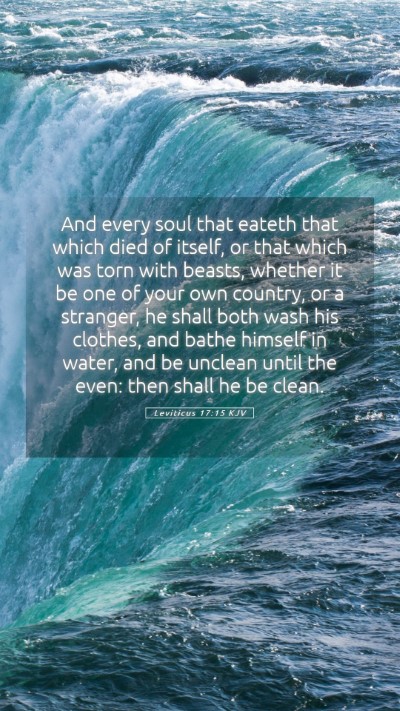Understanding Leviticus 17:15
Bible Verse: Leviticus 17:15 - "And every soul that eateth that which died of itself, or that which was torn with beasts, whether it be one of your own country, or a stranger, he shall both wash his clothes, and bathe himself in water, and be unclean until the even: then shall he be clean."
Bible Verse Meanings and Interpretations
In this verse, we are instructed regarding the consumption of animals that have died naturally or been killed by wild beasts. The significance lies primarily in maintaining ritual purity within the Israelite community.
Contextual Analysis
Matthew Henry emphasizes that Israel's dietary regulations were not merely about food but about maintaining holiness. The Israelites were called to be a distinct people, and these laws helped set them apart even in their eating habits.
Albert Barnes notes that the prohibition against consuming carrion underscores the importance of respecting life and the laws God established for the community's welfare. This verse serves as a protective measure against defilement.
Adam Clarke highlights the process of purification necessary for those who consumed forbidden food, leveraging the physical act of washing as a means to emphasize spiritual cleanliness and the importance of rituals in worship.
Detailed Bible Verse Explanation
- Understanding Ritual Purity: The concept of being "unclean" until the evening denotes a temporary state of impurity that is remedied through proper actions, reinforcing the need for community standards.
- Respect for Life: This command reflects a broader biblical principle regarding the treatment of animals and the sanctity of life, which aligns with God's concern for creation.
- Community Distinctiveness: By adhering to these laws, the Israelites demonstrated their identity as God’s chosen people, reinforcing their covenant relationship with Him.
Application to Daily Life
While the specifics of these laws may not apply directly to modern Christian practices, the underlying principles of maintaining purity, respecting life, and adhering to God's commands remain relevant. Believers are encouraged to think critically about what they consume physically and spiritually.
Cross References
- Exodus 22:31 - Discusses the treatment of animals and holiness.
- Leviticus 11 - Provides dietary laws and principles of cleanliness.
- Deuteronomy 14:21 - Further defines the sanctity of dietary practices.
Conclusion
This verse provides insights into the discipline and lifestyle expected of the Israelites, serving as a reminder of the spiritual truths regarding holiness and community responsibility. Understanding such Bible verse meanings can enrich one's Bible study insights and enhance scripture analysis in both individual and group settings.


